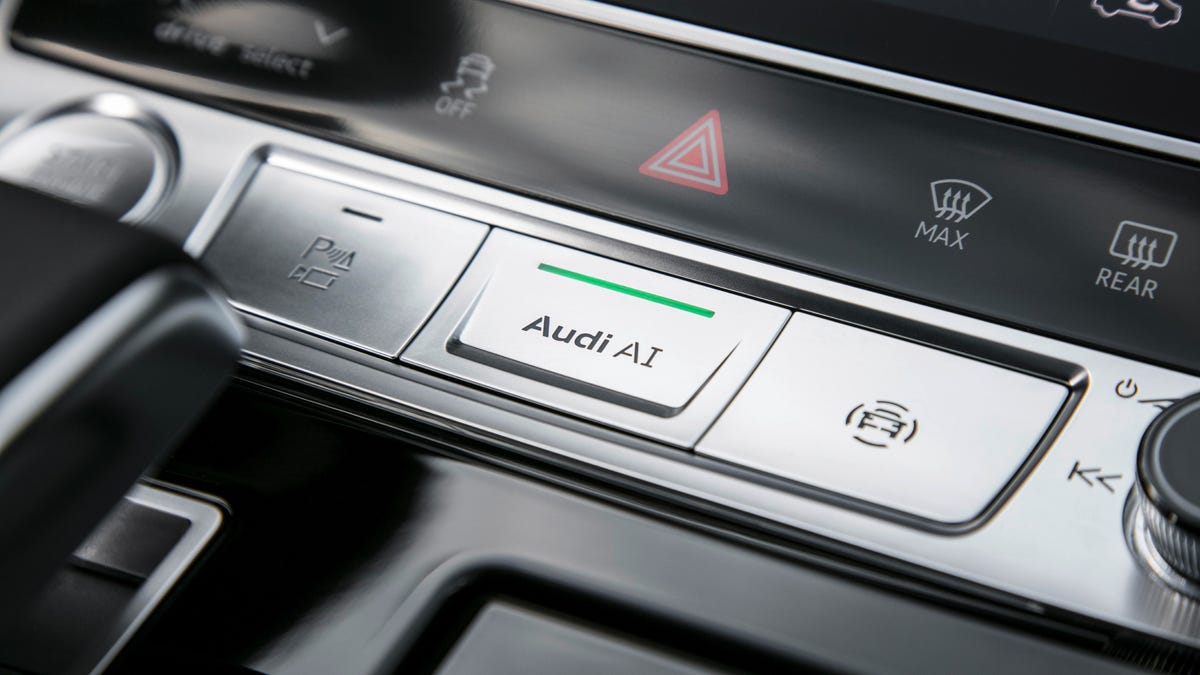Audi says 2019 A8's Level 3 self-driving tech capable of doubling speed
The German automaker won't be content with Traffic Jam Pilot's current 37-mph limit. It wants to hit 81.

Audi has higher-speed ambitions for the Level 3 self-driving system in its forthcoming 2019 A8, but first, the company has some work to do.
The automaker introduced its flagship sedan in July, but the company still has a long, country-by-country journey to win approval for its Traffic Jam Pilot semiautonomous hardware if it wants to bring this tech to consumers. This being the first such production system ever to be submitted for government approval anywhere, it's uncharted waters for the auto industry, and it's unclear when -- or even if -- the German carmaker will gain legal approval in major countries such as Germany and the US.
But that isn't stopping Peter Mertens, member of Audi's board of management for technical development, from thinking bigger -- and more importantly -- faster. Audi is presently working to legally certify the A8's system at speeds up to 37 mph (60 kph), which would be sufficient for the sort of low-speed bumper-to-bumper snarls that regularly mar commutes in cities such as Los Angeles and Boston. But in a media roundtable at the Frankfurt Motor Show this week, Mertens proclaimed that the A8's Level 3 system is capable of much greater velocities.
Traffic Jam Pilot is expected to arrive with a 37-mph limit. But more than double is in sight.
How much greater? He thinks the next step is "something around" 130 kph -- 81 mph -- "in the near or midterm future." That type of speed would enable most driver's freeway commutes to be handled essentially hands-off, provided road conditions suit Traffic Jam Pilot's operational parameters in the first place.
To be used at speeds up to its current proposed 37-mph threshold, TJP presently surveys its various sensors, including ultrasonic, short- and long-distance radar, cameras and arguably most importantly, lidar (a kind of laser radar). This conditionally automated technology also requires clear lane markings and a divided freeway, with oncoming traffic separated by a physical central barrier like a guardrail or a concrete berm. Unlike Tesla's controversial AutoPilot system, used in its Model S and Model X electric cars, TJP simply won't activate unless those road conditions are met.
Critically, when Traffic Jam Pilot is enabled, there is no shared legal responsibility for vehicle behavior -- Audi assumes culpability.
Mertens, 56, says that the hardware that makes up the A8's self-driving system is already up to the challenge of higher speeds and has been future-proofed for life beyond Level 3 "and potentially more, because it has built-in redundancies already for steering, for braking, for [the] electrical system." But even if the system doesn't need additional componentry to reach higher speeds, Mertens knows "…it gets tougher because things happen much, much faster. You need to have a faster calculation, sensor fusion, decision taking. Decision taking becomes more critical."
Peter Mertens.
The system's zFAS brain won't just need to work more quickly, it will also need different road conditions and additional programming. Mertens: "It is crucial [to have] lane change -- automatic lane change -- and having a shoulder [lane]. And with that, we and the technology are able to park the car safely if the driver doesn't respond."
That would be a significant change in operating conditions versus today's Traffic Jam Pilot. Audi is expecting to bring the 37-mph-capable system to market as a single-lane proposition that relies on the driver to manually execute all lane changes, including emergency situations where the driver fails to respond to the car's request to retake control. In such instances, the A8 executes a series of escalating warnings before bringing itself to a stop in-lane with the hazard lights on. To operate at the higher speeds Mertens is envisioning, the car will need to be able to safely make its way over to a shoulder lane and stop entirely on its own.
Audi's belief in the safety and salability of Level 3 autonomous hardware isn't shared by a number of parties in the rest of the industry, including Ford, Volvo and Google, all of which are working on their own autonomous car tech. Officials from these companies have stated publicly that they find such conditional-automation systems to be too difficult to bring to market safely because of the difficulties inherent in handoff situations, wherein the vehicle requires the driver to retake manual control. Those companies' engineers are essentially working to skip right past Level 3 and move into Level 4 and 5 systems, where the vehicle is capable of driving itself at all times.
Mertens sees the road to self-driving cars differently, viewing it as a gradual progression: "I always say ... it's not something where at one point of time you see a quantum leap in functionality and all of a sudden autonomous drive is there in all its beauty, and everywhere [is] Level 4 and 5. It's more step by step by step by step."
For the moment, though, Audi's first big step will be to get lawmakers to approve delivering Traffic Jam Pilot to consumers in any form.

